5 Surprising Health Benefits of Vitamin D3 and K2
Table of Contents
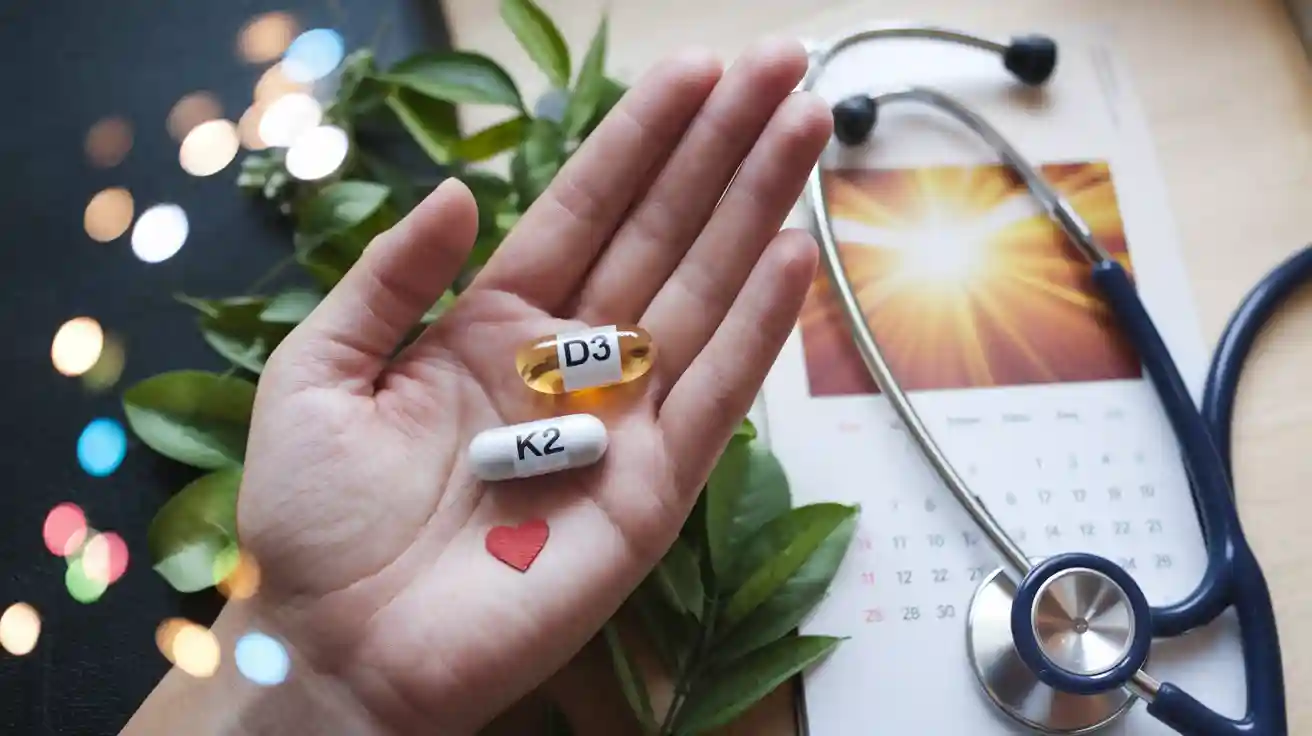
Many people miss out on the health benefits of vitamin D3 and K2, even though deficiency is common worldwide—over 47% have low vitamin D3 levels. When you take these supplements together, you unlock five surprising benefits: stronger bones, better heart health, a powerful immune boost, improved mood, and optimized calcium use. Most think vitamin D3 and K2 work alone, but science shows their true power comes from synergy.
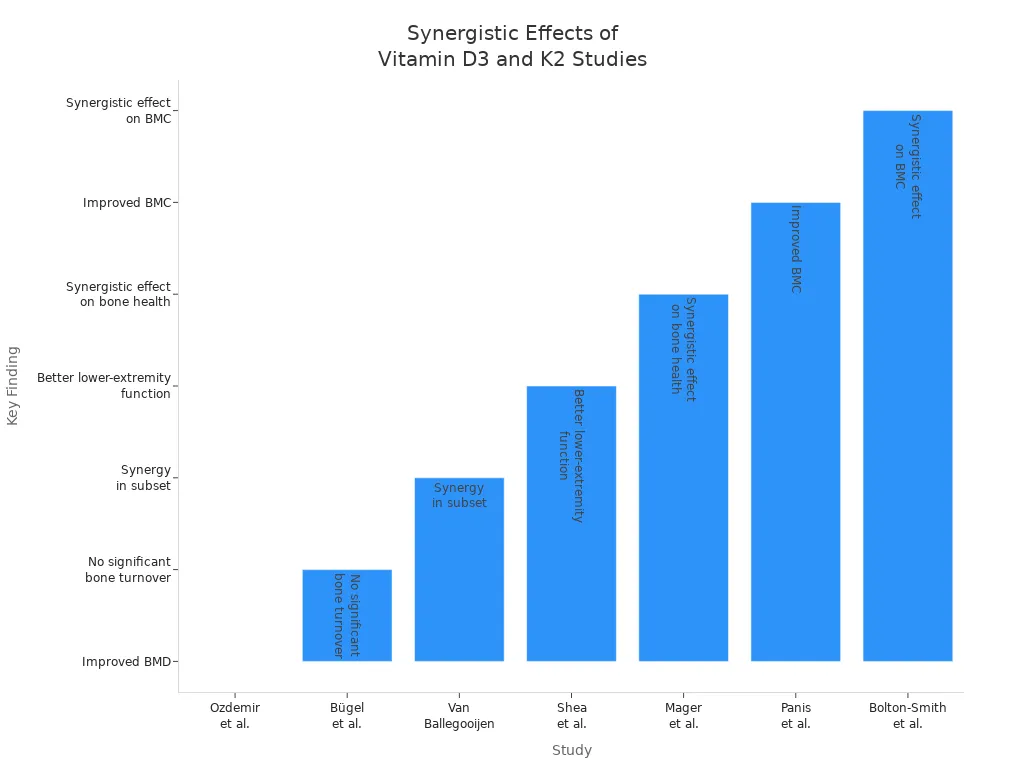

Many believe myths about vitamin D3 and K2, such as thinking K2 only helps bones or that taking too much is always safe. When you learn how these vitamins work together, you gain a whole new perspective on your health.
Health Benefits for Bones
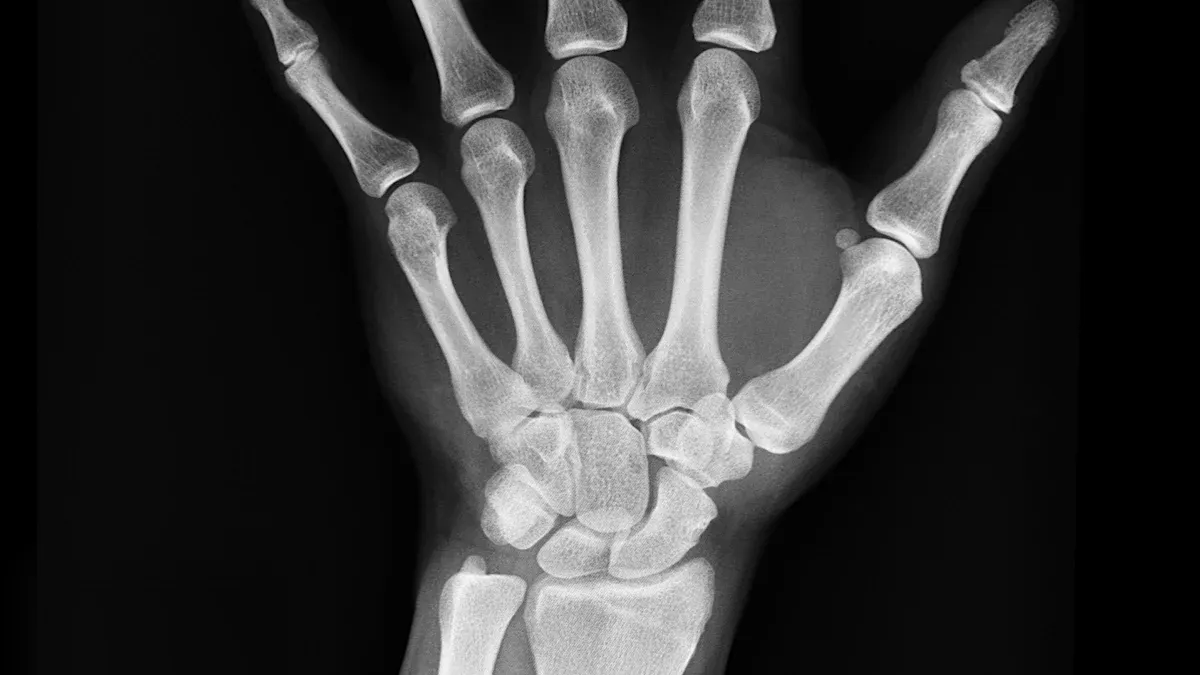
Stronger Bones with Vitamin D3 and K2
You want strong bones that last a lifetime. Vitamin D3 and K2 work together to help you build healthy bones and keep them strong. When you take vitamin D3, your body absorbs more calcium from food. K2 makes sure that calcium goes into your bones, not your arteries. This teamwork helps you promote bone health and avoid problems later in life.
Let’s look at what studies show about this powerful combination:
| Study Type | Participants | Intervention | Key Findings |
|---|---|---|---|
| Pilot Study | 22 postmenopausal women | 2,000 IU vitamin D3 and 37.5 µg vitamin K2 daily for 60 days | 7.6% increase in DKK-2 levels, indicating potential improvement in bone health markers |
| Clinical Trial | 92 postmenopausal women with osteoporosis | Vitamin D3, K2, and calcium groups | Significant increase in BMD in the D and K groups compared to calcium, with the DK group showing the highest increase |
You see that vitamin D3 and K2 together help your bones get stronger, especially if you have osteoporosis. The combination improves bone mineral density more than calcium alone.
Reduced Fracture Risk
You want to avoid broken bones as you get older. Vitamin D3 and K2 help lower your risk of fractures by making your bones tougher. D3 helps your body absorb calcium, while K2 activates proteins that move calcium into your bones.
| Vitamin | Role in Calcium Absorption and Transport to Bones |
|---|---|
| D3 | Promotes osteoblast maturation and calcium uptake, influencing bone health through the vitamin D receptor. |
| K2 | Activates osteocalcin, which helps import calcium into bones, enhancing mineralization and reducing fracture risk. |
| Mechanism | Description |
|---|---|
| Osteocalcin Activation | Vitamin K activates osteocalcin, which is crucial for calcium incorporation into bone. |
| Matrix Gla Protein | Vitamin K is essential for the activation of MGP, which aids in calcium transfer from circulation to bones. |
You can see how these vitamins help your bones use calcium the right way. Studies show that people who take vitamin D3 (800-1000 IU/day) have a pooled relative risk of 0.87 for fractures, which means fewer broken bones compared to those who do not supplement.
Tip: For healthy bones, experts recommend 10,000 to 20,000 IU of vitamin D3 and 100 to 200 micrograms of K2 each day.
Regular use of vitamin D3 and K2 may improve early bone fusion rates in people with osteoporosis. Scientists still study the long-term effects, but you can feel confident that these vitamins support your bone health.
Heart Health and Vitamin K2
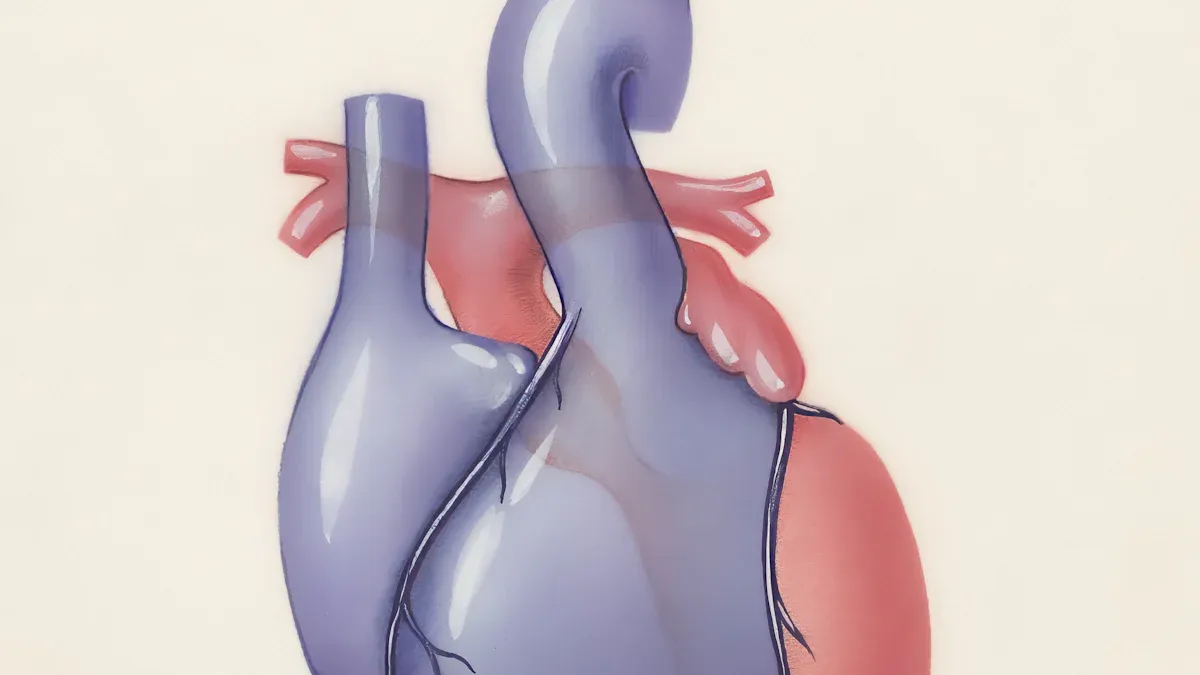
Cardiovascular Support
You want your heart to stay strong and healthy for years to come. Vitamin D3 and K2 play a big role in supporting your cardiovascular health. When you take these vitamins together, you help your body use calcium the right way. Vitamin D3 helps you absorb more calcium from your food. K2 makes sure that calcium goes to your bones, not your arteries. This teamwork helps you lower risk of heart disease.
Here are some ways vitamin K2 and D3 support your heart:
- K2 helps your blood vessels work better.
- K2 moves calcium into your bones, keeping it out of your arteries.
- K2 helps your heart make energy by supporting ATP production.
- Vitamin D3 boosts calcium absorption, which is important for your heart.
- Without enough K2, calcium can build up in your blood vessels.
You can see how these vitamins protect your heart and blood vessels. When you get enough K2, you lower risk of heart disease and keep your arteries flexible.
| Vitamin | Concentration |
|---|---|
| D3 | 25 μg/day |
| K2 | 720 μg/day |
These amounts help you get the most cardiovascular benefits.
Preventing Arterial Calcification
Arterial calcification means calcium builds up in your arteries. This can make your blood vessels stiff and raise your risk for heart problems. Vitamin K2 helps stop this from happening. It activates special proteins, like Matrix Gla Protein (MGP), that keep calcium out of your arteries.
- K2 activates MGP, which blocks calcium from sticking to artery walls.
- Studies show that people who take K2 have less calcium in their arteries.
- Long-term use of K2 can slow down or even reduce artery calcification.
- People with heart disease often have lower levels of K2.
| Population Group | Risk Level for Vitamin K2 Deficiency | Notable Findings |
|---|---|---|
| Patients with CAD | Higher risk | Significantly lower serum levels of MK-4 and MK-7 |
| Unstable Angina Patients | Most pronounced decrease | Lowest concentration levels of vitamin K2 analogs |
| STEMI and NSTEMI Patients | Peak reduction | Lowest concentration levels, especially MK-7 |
You can see that getting enough vitamin K2 helps you avoid artery problems and supports your overall health. When you combine vitamin D3 and K2, you unlock health benefits that go beyond what each vitamin can do alone. This powerful pair helps you lower risk of heart disease and keep your cardiovascular health in top shape.
Immunity and Vitamin D3
Boosting Immune Response
You want your immune system to work at its best every day. Vitamin d3 and k2 together help you boost immunity and keep your body ready to fight off germs. When you take vitamin d3, your body makes more antimicrobial peptides. These special proteins, like cathelocidin and beta defensin 4, help your body destroy harmful bacteria and viruses before they make you sick.
- Vitamin d3 increases the production of antimicrobial peptides.
- Macrophages, your body’s first line of defense, use vitamin d3 to recognize and attack bacteria.
- People with low vitamin d3 levels get more infections, especially in the winter.
The Carlberg team found that the timing of vitamin d3 supplementation can change how your immune system responds. Their research shows that you can use vitamin d3 and k2 together to help your body react faster and stronger to threats.
You can see the link between vitamin d3 levels and common infections in this table:
| Vitamin D Level (25OHD) | Prevalence of Upper Respiratory Tract Infection (%) |
|---|---|
| <10 ng/mL | 24% |
| 10–30 ng/mL | 20% |
| ≥30 ng/mL | 17% |
Keeping your vitamin d3 levels up can help you avoid getting sick as often.
Balanced Immune Function
You need a balanced immune system to stay healthy. Vitamin d3 and k2 together help your body avoid overreacting, which can lead to inflammation or autoimmune problems. Vitamin k2 helps reduce inflammation by blocking harmful signals in your body.
| Finding | Description |
|---|---|
| Correlation with Inflammatory Biomarkers | Vitamin k intake is negatively correlated with systemic immune inflammatory biomarkers, indicating its role in reducing inflammation. |
| Inhibition of Inflammatory Pathways | Vitamin k has been shown to inhibit the NF-κB signaling pathway, which reduces the production of inflammatory factors. |
| Impact on Cytokines | Different forms of vitamin k2 (MK-4 and MK-7) suppress proinflammatory cytokines such as TNF-α, IL-1β, and IL-6, contributing to a balanced immune response. |
Vitamin d3 and k2 together support immune regulation and disease prevention. They help reduce inflammation and may reduce autoimmune diseases. Studies show that people with low vitamin d3 have a higher risk of autoimmune diseases like multiple sclerosis and type 1 diabetes. When you use these supplements, you unlock health benefits that go beyond fighting infections.
Mood and Well-being
Mood Regulation
You may not realize how much vitamin d3 and k2 can affect your mood. These vitamins help your brain make important chemicals that keep you feeling happy and calm. When your body has enough d3, it helps produce serotonin and dopamine. These are neurotransmitters that control your mood and help you handle stress.
- Vitamin d3 helps prevent sadness and anxiety.
- Low levels of vitamin d3 are linked to more depression and anxiety.
- Higher vitamin d3 levels often mean better mood, especially in winter.
- Vitamin k2 helps your body use d3 better, which is important for mood.
Many people feel down during the winter months. You can support your emotional well-being by keeping your vitamin d3 levels healthy.
You can see how common mood problems are in people with low vitamin d3 and k2:
| Study Title | Findings |
|---|---|
| Prevalence and Correlates of Vitamin D Deficiency in a Sample of 290 Inpatients With Mental Illness | 94% of psychiatric patients showed vitamin D inadequacy, with low vitamin D levels linked to mood disorders. |
| Association of vitamin D with depression prevalence in U.S. adults | Higher serum vitamin D levels correlated with reduced depressive symptoms. |
Vitamin d3 also protects your brain cells and helps them work better. This means you may feel more balanced and less stressed when you get enough of these vitamins.
Mental Clarity
You want to think clearly and remember things easily. Vitamin d3 and k2 help your brain stay sharp. Studies show that people with low d3 have trouble with memory, focus, and quick thinking. When you keep your d3 levels up, you support your brain’s ability to make decisions and solve problems.
| Benefit | Description |
|---|---|
| Cognitive Function | Supports memory, focus, and vitality, potentially reducing risks tied to cognitive decline. |
| Mood Improvement | Low vitamin d levels are linked to mood challenges; supplementation can enhance overall well-being. |
| Energy Levels | Vitamin k2 supports mitochondrial function, providing steady energy to the brain and body. |
| Brain Health | Vitamin d3 regulates immune activity in the brain, protecting neurons from inflammation. |
Neuropsychological research shows that d3 helps your brain process information faster. You may notice better judgment, quicker recall, and improved focus when you have enough d3. These health benefits can make daily life easier and more enjoyable.
Optimized Calcium Use
Proper Calcium Absorption
You want your body to use calcium in the best way possible. Vitamin D3 and K2 help you do this. When you take vitamin D3, your body can absorb calcium from the food you eat. This process is important for your bone strength and overall health. Vitamin K2 works with D3 to make sure your body uses calcium where it is needed most.
- Vitamin D3 helps your body metabolize calcium, which is essential for strong bones.
- Vitamin K2 ensures that calcium gets deposited in your bones, not in your arteries.
- When you use both vitamins together, you improve calcium absorption and support your bone health.
If you want to get these vitamins from food, you have many options. Here are some of the best sources:
| Food Source | Vitamin D3 Content (IU) | Vitamin K2 Content (mcg) |
|---|---|---|
| Wild Salmon (3.5 oz) | 600-1000 | N/A |
| Egg Yolks (pasture-raised) | 40 | N/A |
| Fortified Dairy (8 oz) | 100-144 | N/A |
| Natto (100g) | N/A | 1000 |
| Aged Cheeses | N/A | Moderate |
| Grass-fed Dairy | N/A | Smaller quantities |
| Organ Meats | N/A | Smaller quantities |
Tip: Eating a mix of these foods can help you get enough vitamin D3 and K2 for better calcium absorption.
Directing Calcium to Bones and Teeth
You want calcium to go to your bones and teeth, not your soft tissues. Vitamin D3 and K2 work together to make this happen. D3 helps you absorb calcium, while K2 directs it to the right places.
- Vitamin D3 and K2 regulate how your body uses calcium.
- Without enough K2, D3 cannot direct calcium to your bones.
- D3 increases calcium absorption from food.
- K2 sends calcium to your bones and teeth, stopping it from building up in your arteries or soft tissues.
- D3 triggers your body to make proteins like osteocalcin and matrix Gla protein (MGP).
- K2 activates these proteins, so they can bind calcium and move it to your bones.
If your body does not have enough K2, you may face problems. Low K2 can lead to weaker bones and a higher risk of fractures. Calcium may build up in your arteries, which can raise your risk of heart disease. K2 helps stop this by keeping calcium out of soft tissues.
Note: Getting enough vitamin D3 and K2 helps you keep your bones strong and your arteries clear. You protect your bone health and lower your risk of heart problems.
You have seen how vitamin D3 and K2 support your bones, heart, immune system, mood, and calcium use. When you take these together, you get even more benefits. Studies show that combined supplementation can boost bone mineral density and lower blood sugar and blood pressure.
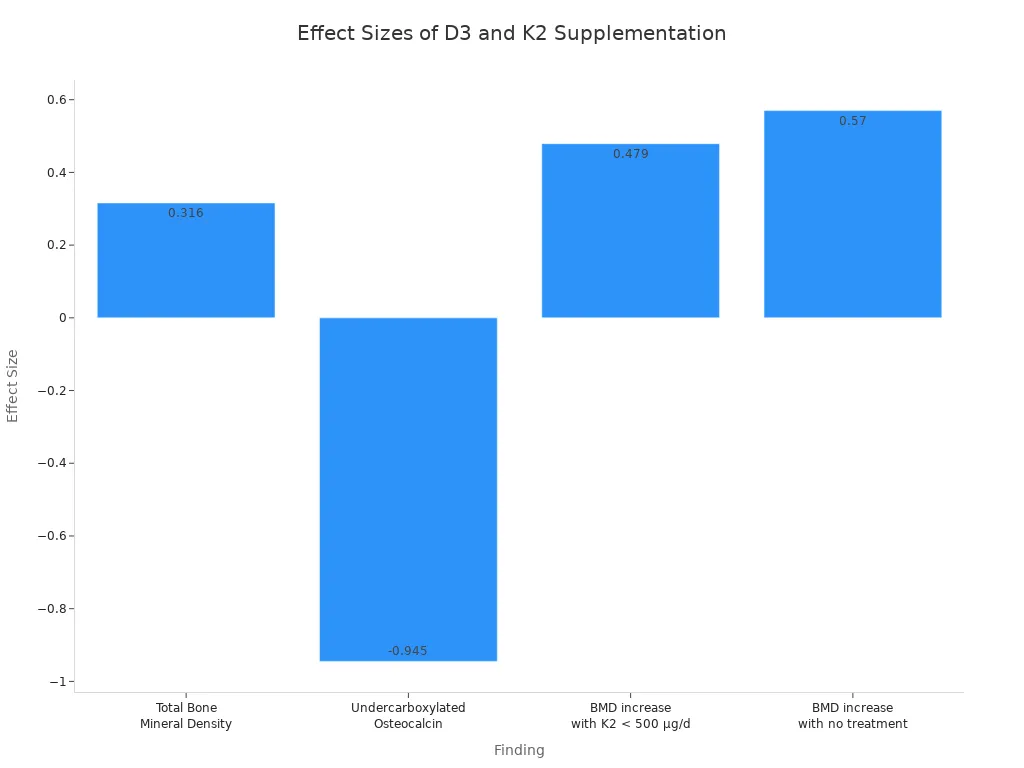

- Adult women should aim for at least 15 mcg of vitamin D and 90 mcg of vitamin K each day.
- Always talk to your doctor before starting new supplements.
Choosing the right nutrients helps you take charge of your health and feel your best every day.
FAQ
Can you take vitamin D3 and K2 together?
Yes, you can take vitamin D3 and K2 at the same time. These vitamins work together to help your body use calcium the right way. You get stronger bones and a healthier heart when you use both.
What foods have vitamin D3 and K2?
You find vitamin D3 in salmon, egg yolks, and fortified milk. You get vitamin K2 from natto, aged cheese, and grass-fed dairy.
Tip: Try to eat a mix of these foods for better health.
How do you know if you need vitamin D3 and K2 supplements?
You may need supplements if you spend little time outside or eat few foods with these vitamins. Your doctor can check your levels with a blood test.
| Sign You May Need Supplements |
|---|
| Weak bones |
| Feeling tired |
| Frequent illness |
Are there side effects from taking vitamin D3 and K2?
Most people do not have side effects when they take the right amount. If you take too much, you may get headaches or feel sick. Always follow your doctor’s advice.
How long does it take to see benefits?
You may notice changes in a few weeks. Stronger bones and better mood can take a few months.
Stay consistent with your supplements for the best results.

Poseidon
Master of Nutritional Epidemiology, University of Copenhagen, Herbal Functional Nutrition Researcher
Focus: The scientific application of natural active ingredients such as Tongo Ali, Horny Goat Weed, and Maca to sexual health and metabolic regulation.
Core Focus:
Men: Use a combination of Tongo Ali (an energizing factor) + Maca (an energy reserve) to improve low energy and fluctuating libido.
Women: Use a combination of Horny Goat Weed (a gentle regulator) + Maca (a nutritional synergist) to alleviate low libido and hormonal imbalances.
Stressed/Middle-Aged Adults: This triple-ingredient synergy supports metabolism, physical strength, and intimacy.
Product Concept:
Based on traditional applications and modern research (e.g., Tongo Ali promotes testosterone-enhancing enzyme activity, and icariin provides gentle regulation), we preserve core active ingredients and eschew conceptual packaging—using natural ingredients to address specific needs.
Simply put: I'm a nutritionist who understands "herbal actives." I use scientifically proven ingredients like Tongo Ali, Epimedium, and Maca to help you make "sexual health" and "nutritional support" a daily routine.
